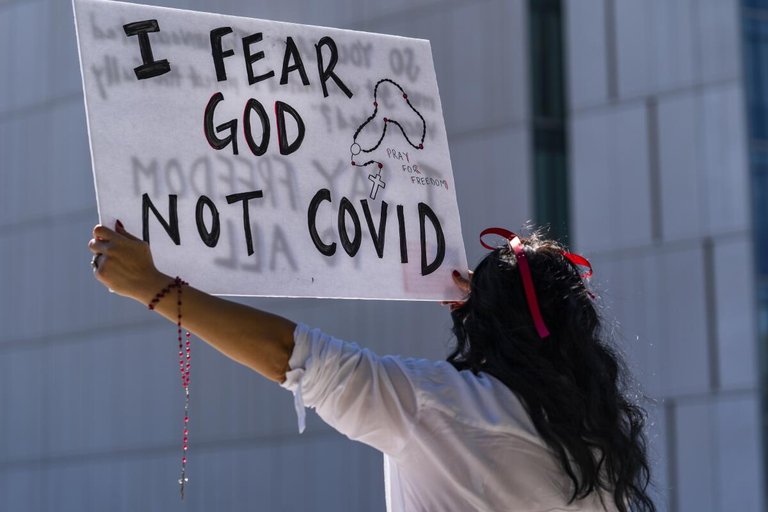Employers Beware: Recent Court Wins Highlight Violations of Religious Accommodation Laws in COVID-19 Vaccine Measures

Image Source: https://www.latimes.com/california/story/2021-09-23/religious-exemption-covid-vaccine-explained
Authored by: @greywarden100
*Published: June 28, 2025.
The COVID-19 pandemic brought unprecedented workplace challenges, including vaccine measures that sparked legal battles over religious discrimination and retaliation. Across the United States, employees with sincerely held religious beliefs opposing vaccination have begun to prevail in court, exposing employer practices that violate federal and state laws. These cases underscore the importance of understanding Title VII of the Civil Rights Act of 1964, which prohibits discrimination based on religion and mandates reasonable accommodations unless they impose undue hardship. Let’s explore the laws employers have breached and the landmark victories won by plaintiffs.
Laws Employers Violated
Title VII requires employers to accommodate employees’ sincerely held religious beliefs, practices, or observances unless doing so would cause an undue hardship—defined by the Supreme Court in Groff v. DeJoy (2023) as a significant burden on business operations, not a mere inconvenience. Employers have stumbled by:
Failing to Provide Reasonable Accommodations: Title VII mandates an interactive process to explore alternatives like remote work, masking, or testing, tailored to the employee’s beliefs. Instead, some employers imposed blanket measures, ignoring individual needs, violating 29 C.F.R. § 1605.2(c)(2).
Denying Sincerely Held Beliefs Without Evidence: Courts have ruled that employers cannot dismiss religious objections as insincere without substantial proof. The EEOC guidance (2021) advises assuming sincerity unless evidence suggests otherwise, yet some employers rejected requests based on personal skepticism, breaching 42 U.S.C. § 2000e(j).
Retaliating Against Protected Activity: Terminating or disciplining employees for requesting accommodations or filing EEOC charges violates 42 U.S.C. § 2000e-3(a), which protects against retaliation. Rapid adverse actions post-request have been deemed retaliatory.
Misapplying Undue Hardship Claims: Pre-Groff, some employers leaned on a minimal burden standard (Trans World Airlines v. Hardison, 1977), but the updated standard demands concrete evidence of substantial impact. Unsubstantiated claims of hardship have failed in court.
Ignoring Evolving Beliefs: The EEOC recognizes that religious beliefs can evolve, requiring ongoing accommodation efforts. Employers who dismissed updated objections as inconsistent violated this duty, per EEOC Compliance Manual, Section 12-IV(A)(3).
These violations reflect a broader failure to engage with federal protections, often prioritizing policy compliance over legal obligations.
Landmark Court Victories for Plaintiffs
Recent cases demonstrate that courts are holding employers accountable. Here are the notable wins where plaintiffs prevailed due to religious discrimination or retaliation over COVID-19 vaccine measures:
Barnett v. Inova Health Care Services (4th Circuit, 2025): A devout Christian nurse won reinstatement of her Title VII suit. The Fourth Circuit found her belief—rooted in prayer and Biblical guidance—that vaccination was sinful was sincerely held and religious, surviving a motion to dismiss. The court emphasized that sincerity is a credibility issue, not a pleading-stage bar.
Lisa Domski v. Blue Cross Blue Shield of Michigan (Detroit Jury, 2024): A Catholic IT specialist was awarded $12.7 million after being fired for refusing vaccination due to beliefs about fetal cell lines in vaccine development. The jury found unlawful discrimination and retaliation under federal and Michigan law, with $10 million in punitive damages signaling employer misconduct.
EEOC v. United Healthcare Services, Inc. (S.D. Ohio, 2023): The EEOC sued on behalf of a telecommuter denied a religious exemption. The case settled with injunctive relief and damages, affirming that remote workers’ beliefs must be accommodated absent undue hardship, violating Title VII.
EEOC v. Rex Healthcare, Inc. (E.D. N.C., 2024): A remote employee fired despite a prior flu vaccine exemption won an EEOC lawsuit. The agency proved Rex failed to accommodate her beliefs, breaching Title VII’s accommodation mandate.
Justice Department v. Advanced Science and Technology Education Charter Schools (W.D. Okla., 2025): A teacher denied an exemption without a clergy letter received $95,000 and policy changes. The consent decree highlighted that rigid exemption criteria violate Title VII’s broad protection.
North Carolina Symphony Case (E.D. N.C., 2024): Musicians, including Buddhists and a Jew, won against a symphony’s measures. The court upheld their claims that testing on animals and bodily integrity beliefs were religious, rejecting a free exercise dismissal and finding retaliation.
These victories span industries—healthcare, insurance, education, and arts—showing the issue’s breadth. Courts consistently ruled that employers must individually assess beliefs, engage in dialogue, and justify hardships with evidence, not assumptions.
Lessons for Employers
The trend is clear: courts are skeptical of blanket denials and punitive actions. Employers should:
- Train HR on Title VII’s interactive process.
- Document accommodation discussions and hardship analyses.
- Avoid questioning belief sincerity without clear, non-discriminatory grounds.
- Consult legal counsel before denying exemptions.
As more cases emerge, the message is stark: violating religious accommodation laws carries steep financial and reputational costs. Employees’ rights to practice their faith at work are protected, and the judiciary is enforcing that promise.
Follow @greywarden100 for updates on employment law and justice.
You stuck strong to your faith, Grey
Posted using SoMee
Those were the dark days. I hate those years. I was branded hardheaded for not taking a vaccine. I was just waiting to be fired. Now, after a few years, Pontius Pilate is washing his hands and shifting the blame to corporations. This should be a lesson to employers in implementing policies that are contrary to the constitution. This would backfire, as in the cases you mentioned. No one thinks that those Covid years could be an opportunity for financial reparation after a few years.
!BBH
!PIZZA
!LOLZ
lolztoken.com
Turns out good players are hard to find.
Credit: marshmellowman
@greywarden100, I sent you an $LOLZ on behalf of rzc24-nftbbg
(1/10)
Delegate Hive Tokens to Farm $LOLZ and earn 110% Rewards. Learn more.
$PIZZA slices delivered:
@rzc24-nftbbg(1/10) tipped @greywarden100
Come get MOONed!
!BBH